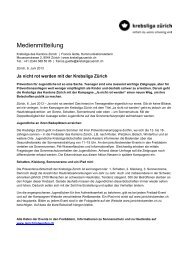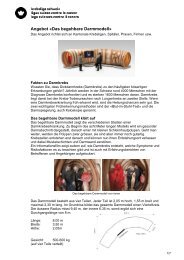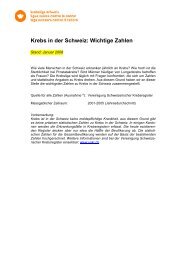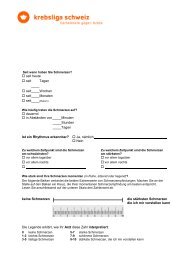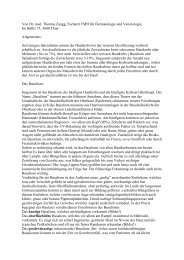Cancer Research in Switzerland - Krebsliga Schweiz
Cancer Research in Switzerland - Krebsliga Schweiz
Cancer Research in Switzerland - Krebsliga Schweiz
Create successful ePaper yourself
Turn your PDF publications into a flip-book with our unique Google optimized e-Paper software.
112<br />
In this project we will <strong>in</strong>vestigate whether the RasGAP<br />
peptide can <strong>in</strong>deed block the formation of metastases <strong>in</strong><br />
mice. We will also study the mode of action of the peptide<br />
on tumour cells by <strong>in</strong>vestigat<strong>in</strong>g the effect of the peptide<br />
on cell adhesion molecules and on the cytoskeleton. These<br />
experiments might lead to cl<strong>in</strong>ical application <strong>in</strong> humans.<br />
Project coord<strong>in</strong>ator<br />
Prof. Dr Christian Widmann<br />
Département de physiologie<br />
Université de Lausanne<br />
Rue du Bugnon 7<br />
CH1005 Lausanne<br />
Phone +41 (0)21 692 51 23<br />
Fax +41 (0)21 692 55 95<br />
christian.widmann@unil.ch<br />
Wymann Matthias Paul | Identification and modulation<br />
of targets to reprogram glioblastoma cancer stem<br />
cells (KFS 02680082010)<br />
Duration: 01.01.2011– 01.01.2014<br />
Glioblastoma multiforme (GBM) is a very aggressive bra<strong>in</strong><br />
tumour. A signall<strong>in</strong>g pathway connect<strong>in</strong>g a lipid k<strong>in</strong>ase<br />
(phospho<strong>in</strong>ositide 3k<strong>in</strong>ase (PI3K)) to a nutrient sensor<br />
complex (target of rapamyc<strong>in</strong> (mTOR)) constitutes a central<br />
piece of GBM aetiology. To date, little is known regard<strong>in</strong>g<br />
relevant signall<strong>in</strong>g downstream of the lipid product PtdIns(3,4,5)P3<br />
of PI3Ks. Explor<strong>in</strong>g structural determ<strong>in</strong>ants<br />
of putative phospho<strong>in</strong>ositide<strong>in</strong>teract<strong>in</strong>g prote<strong>in</strong>s, we will<br />
assemble pathway modules to be targeted <strong>in</strong> GBM. We<br />
have developed enrichment protocols for GBMderived<br />
cancer stem cells (GBM CSCs). These will be monitored for<br />
phenotypic outputs of pharmacologically and genetically<br />
modulated PIiPsdependent pathways. Pilot studies <strong>in</strong>dicate<br />
that reprogramm<strong>in</strong>g GBM CSCs could drive them<br />
towards differentiation and cell death. The identification<br />
of novel signall<strong>in</strong>g elements <strong>in</strong> GBM CSCs is of critical importance<br />
for develop<strong>in</strong>g novel strategies for the treatment<br />
of this devastat<strong>in</strong>g disease.<br />
Project coord<strong>in</strong>ator<br />
Prof. Dr. Matthias Paul Wymann<br />
Institut für Biochemie und Genetik<br />
Departement Biomediz<strong>in</strong><br />
Universität Basel<br />
Mattenstrasse 28<br />
CH4058 Basel<br />
Phone +41 (0)61 695 30 46<br />
matthias.wymann@unibas.ch<br />
Zaugg Kathr<strong>in</strong> | Elucidat<strong>in</strong>g the role of the hypoxiaprotective<br />
gene CPT1C (Carnit<strong>in</strong>e Palmitoyl-transferase<br />
1C) <strong>in</strong> carc<strong>in</strong>ogenesis (KLS 02569022010)<br />
Duration: 01.05.2010 – 01.05.2011<br />
Hypoxia is a key regulator <strong>in</strong> tumour growth and can lead<br />
through an epigenetic phenomenon to more resistant<br />
cancer cells. In our laboratory we are <strong>in</strong>vestigat<strong>in</strong>g the<br />
mechanism of a gene that modulates cancer cell death under<br />
hypoxic conditions. In addition, it promotes migration<br />
and <strong>in</strong>vasion when overexpressed.<br />
Project coord<strong>in</strong>ator<br />
Dr. Kathr<strong>in</strong> Zaugg<br />
Labor für angewandte RadioOnkologie<br />
UniversitätsSpital Zürich<br />
NUK E 17<br />
Rämistrasse 100<br />
CH8091 Zürich<br />
Phone +41 (0)44 255 29 30<br />
Fax +41 (0)44 255 44 35<br />
kathr<strong>in</strong>.zaugg@usz.ch<br />
Zavolan Mihaela | Identification of cancer-related<br />
targets of <strong>in</strong>dividual members of the miR-17~92 cluster<br />
of miRNA (KFS 02477082009)<br />
Duration: 01.01.2010 – 01.01.2013<br />
MicroRNAs (miRNAs) are short RNA molecules that regulate<br />
expression of prote<strong>in</strong>cod<strong>in</strong>g genes that play important<br />
roles <strong>in</strong> the growth, division, differentiation and apoptosis<br />
of cells. Some act as cancer suppressors, downregulat<strong>in</strong>g<br />
cancerpromot<strong>in</strong>g cellular factors, while others are oncogenic,<br />
promot<strong>in</strong>g malignancies. We are study<strong>in</strong>g the miR<br />
17~92 miRNA family, which consists of six related miRNAs<br />
that collectively have been implicated <strong>in</strong> various lymphomas,<br />
as well as lung, bladder and colon cancers. Our project<br />
aims to uncover the targets and pathways that <strong>in</strong>dividual<br />
members of the miR17~92 cluster affect <strong>in</strong> br<strong>in</strong>g<strong>in</strong>g<br />
about carc<strong>in</strong>ogenesis. We comb<strong>in</strong>e highthroughput experiments<br />
with computational predictions and direct molecular<br />
biology techniques for target validation. By observ<strong>in</strong>g<br />
the behaviour of tumourderived cells <strong>in</strong> which we<br />
deplete these targets with small <strong>in</strong>terfer<strong>in</strong>g RNAs, we will<br />
further identify the role of these targets <strong>in</strong> tumour formation.<br />
The targets that we hope to identify would constitute<br />
potential factors for novel drugs that prevent or slow<br />
down cancer formation.<br />
Project coord<strong>in</strong>ator<br />
Prof. Dr. Mihaela Zavolan<br />
Departement Biozentrum<br />
Universität Basel<br />
Kl<strong>in</strong>gelbergstrasse 50–70<br />
CH4056 Basel<br />
Phone +41 (0)61 267 15 77<br />
mihaela.zavolan@unibas.ch




